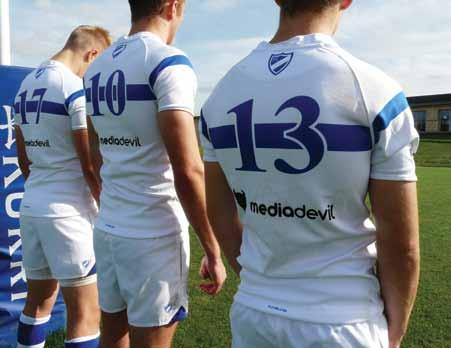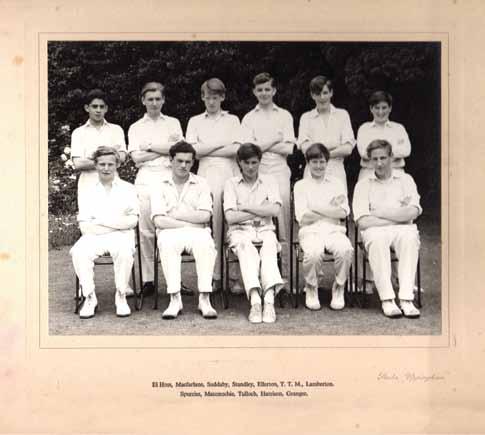
14 minute read
School Days
“What’s it all ab
Abboudi Hoss (Hf 62)
Advertisement
out?”
Abboudi Hoss
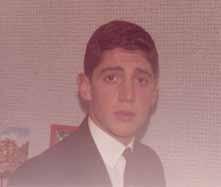
“This is the happiest day of my life!” said my mother when Mr Lloyd, the Headmaster, announced to her that I had been accepted at Uppingham. Immediately, my hopes of finishing school back in “sunny” Lebanon were crushed. I could not share her joy: imagining a dreary boarding school, thousands of miles away from home, and myself, trapped in a grey and black school uniform as opposed to “The Beach Boys” look, which I had cultivated so carefully back in Beirut. My parents owned a popular beach resort along the sandy coast just south of the capital when that city was still the Paris of the Middle East. The Sands, as it was called, once the source of all my fun, now became the primary cause of this dreaded exile. To my parents, this Mediterranean “paradise” was no longer the ideal place to raise their only son, into whose hands the family destiny would fall one day. Uppingham, on the other hand, certainly was!
The picture of my mother waving goodbye as the School Special pulled out of the railway station is still fresh in my mind. That is where and when it all began: three years, six months and twenty-seven days of “character building”, as some of my teachers called it. My longing for the end of each school term and daydreaming about the leisurely life back home was an absorbing distraction; one which I wished I’d spent less time over when facing my final exams. Maybe that is why I never made Oxford or Cambridge as my parents had wished. No matter for what reason, I did not leave my name on a list of noteworthy scholars at Uppingham! What of the rest of Uppingham life, the innumerable tasks, routines and traditions that punctuated the school day, what was that all about? The polishing of praepostors’ shoes, the sewn pockets, the masters’ salutes, the competitive sports, the early morning tish calls, the daily recitals of psalms in Memorial Hall, Sunday Chapel, the CCF and a whole other list of things known only to those inside the periphery of Uppingham School. I had no meaningful answer to that question when I looked back at Highfield, wearing the school uniform for the last time, but as it turned out this was the end of the most important chapter in my life. No academic subject I could have excelled at would have better prepared me for the unforeseen events awaiting me upon my return to Lebanon. The lessons I’d learned outside of the classroom were the ones I’d come to value most. In 1975, a civil war broke out that destroyed generations of dreams and the livelihood of thousands of families, including mine. With nothing of any significance still functioning in either my country and/or business, I found myself standing between an affluent past and a future that depended entirely on what I could or could not achieve. A list of
Highfield Unders Cricket Team 1962.
overwhelming questions came to my mind, such as, what do I embark on next? Would I be able to settle in a foreign land? Could I do without my past in forging the future? Would I cope with a less flamboyant lifestyle? Did I have the courage for all these new challenges? Subsequently I left Lebanon to live and work in Paris, Chicago and Munich, without suffering any culture shocks! What I started to accomplish soon quelled any anxiety I had. Over the years, I founded several businesses totally unrelated to my past which, fortunately, are still doing very well. I am now happily settled in a quiet, small village at the foot of the German Alps with my Bavarian wife and son. There, I have stowed away my Aston Martin in an old cowshed and enjoy driving a Golf just as much. I am now better off in every way than I have ever been before. It took me some 30 years to recuperate everything in Lebanon that the war had destroyed. Throughout this time, a young chap dressed in a grey and black uniform stood at my side, and the life-lessons that he’d learned at Uppingham supported me all along. That’s what it’s all about. Looking back, I agree with my mother, the day I was accepted at Uppingham was the happiest day of my life.
The ‘Upp ingham Ru les’

With football’s governing body the Football Association celebrating its 150th anniversary this year, it is worth recalling the important role that Uppingham played in the development of our national sport. To improve upon existing regulations for football matches (which often ended in fights), Uppingham master, John Charles Thring, published the ‘The Simplest Game’, also known as the ‘Uppingham Rules’ in 1862. This less-violent approach to football was well received and helped to shape the rules by which the game is played today.
Some of the key rules he laid down: 1. A goal is scored whenever the ball is forced through the goal and under the bar, except it be thrown by hand. 2. Hands may be used only to stop a ball and place it on the ground before the feet. 3. Kicks must be aimed only at the ball. 4. A player may not kick the ball whilst in the air. 5. No tripping up or heel kicking allowed. 6. When a ball is kicked behind the line of goal, it shall be kicked off from that line by one of the side whose goal it is. 7. No player may stand within six paces of the kicker when he is kicking off. 8. No charging allowed when a player is
‘out of play’; that is, immediately the ball is behind him. Football remained the main sport at Uppingham until a year after John Thring’s brother Edward died in 1887 when rugby was adopted in its place. Interestingly, three months before his death, Edward Thring made his views on rugby clear in his diary: “The boys mean to go in for that disgusting game Rugby Union which violates the first principles of every game – to make skill everything and to minimise brute force”. With rugby having been an important part of our School for 125 years we feel sure that Thring would have approved of the sport if he were alive today.
I was at Uppingham in West Deyne from 1973 to 1978 and a very enjoyable time I had too. My mother found this photo of us all meeting the late great Cricket commentator Brian Johnston – in the Kendall Room – he had just launched his book ‘It’s Been A Lot Of Fun’. I am behind him with the glasses and scarf and to my right is my great chum James Kirby-Welch (Wd 74) – a fervent Yorkshire supporter. We were great chums with Jonathan Agnew (L 73) – who would have thought that Jonathan would end up working with ‘Johnners’ and become a national treasure like him? You can just see Christopher Metcalfe (Wd 73) peering out from behind my head. Note the old style uniforms – no coloured ties or blazers allowed then! I have very fond memories of all the staff at Uppingham from my era – especially Roy Collard, Basil Morgan, Malcolm and Michele Bussey, Sebastian Greenlaw, David Cunliffe, James Barnett and the wonderful Geoffrey Frowde – we had so many laughs together and amazingly I learnt a huge amount from them that set me up for life!” Robert Robotham (WD 73)

Upp ingham Archives By Christmas 2013 read and search the School Magazine online… ...26 years of the School Magazine have been digitised, and another 26 years should be completed in 2014. If you would like to help finance this project to speed up the process for the full run of the magazine do get in touch with Patrick Mulvihill in the Development Office.
SCHOOL DAYS
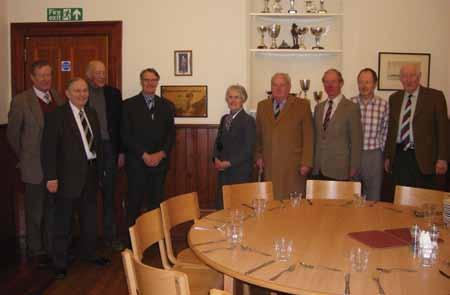
A RO YAL VISIT
When the Duke of Edinburgh opened the first Science Block I was enlisted in the Guard of Honour goodness knows why. We were lined up in front of Martin Lloyd’s front door. I was first in line looking suitably smart and well ‘blancoed’, my present arms perfectly executed. As they approached, the Headmaster asked the Duke if he would like to inspect the Guard of Honour or have a Sherry. Without a thought, the Duke replied ‘A glass of Sherry please’. He then swiftly strode past us without a backward glance. Many hard weeks of training and polishing down the drain in an instant. I have admired the Duke ever since as I cannot fault his judgement!
My Housemaster at Farleigh was David Hodgkinson. Honk sadly died of cancer at Christmas 1958 in the middle of my last year. He was one of Uppingham’s great Housemasters and his lovely wife Jackie got many of our schoolboy hearts fluttering! I was skiing in Zermatt some years ago in the local Church for a Christmas service. There was a beautiful plaque on the wall in David’s memory donated by his climbing friends. The magazine gets better and better. It is the best investment I ever made as I remember paying a rather small lifetime subscription over 50 years ago. Patrick Pease (Fgh 54)
From left to right, John Harvey (M 53), Graham Hill (M 52), Bill Humphrey (M 52), Peter Owthwaite (M 52), Claire Dixon, Basil Frost (M 45), David Hughes (M 53), Stuart Moffat (WD 68) and Tony Gent (M 53).
HeroEs of Bletchley Par
Following on from the last magazine and Stuart Moffat’s (WD 68) findings about Dennis Oswald as one of the unsung hero’s of Bletchley Park, in February two plaques were unveiled at the School. The first is in the Maths block for Bob Roseveare, an ex-staff member at Uppingham from 1970 to 1983 and Head of Maths from 1980 to 1983. Bob worked as a code-breaker at Bletchley Park from 1942 to 1945. The second is for Denis Oswald the Housemaster of Meadhurst from 1946-61 which was unveiled by his daughter Claire Dixon in the presence of OUs that came to Meadhurst in 1952 and 1953. The group kindly raised the monies for Denis’s plaque.

The Headmaster with Bob Roseveare’s son, Rob and the current Head of Maths, Paul Logan.
We were interested to receive the following book review from Dr Malcolm Tozer (member of staff from 1966-1989) on ‘A History of Eton Fives’ by Dale Vargas and Peter Knowles. ‘Uppingham played a distinguished role in the history of Eton fives for nearly one hundred and fifty years; the first English school after Eton to adopt the game; playing a style based on accuracy of touch rather than brute force; for many years scoring matches in a different way to most school; and consistently holding its own within the ‘big six’ – Eton, Shrewsbury, Harrow, Highgate, Charterhouse and Uppingham. A P F Chapman was one of several England cricket captains who sharpened his fielding skills in the fives court. Uppingham’s distinguished role did not quite last one hundred and fifty years. As the authors record, the rise and fall of the game in every school largely depended on the support of the headmaster of the day. This thoroughly researched, lavishly illustrated and lightly written history will appeal to all aficionados of Eton fives. Further information and Malcolm’s full review can be found on the OU website.
The OU Office team were pleased to receive this sketch of some of the school buildings as viewed from ‘The Middle’ by Philip Easton (Hf 48), which he drew 60 years ago. In the foreground, some may recognise the old music school where Philip spent much of his time; he still very much enjoys musical activities to this day, singing and composing piano music.
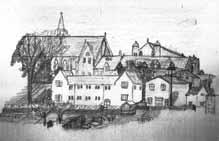
HOME
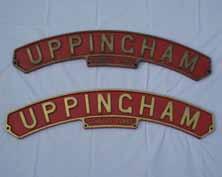
End of Term 27th July 1947: The Special Train at Uppingham Station. Photograph by David Hindley (WD 44).

An old boy of Highfield has generously given the School the second Uppingham name-plate that was attached to Southern Railway Schools Class locomotive No. 923. The other gun metal name-plate has been in the School’s possession since the late 1960s. We are investigating whether Uppingham is the only school (40 schools were named) which owns both original nameplates. The School Archivist headed south to collect this rare and valuable item at the end of last term. A decision is to be made where the name-plates are to hang in the School, so that they can be seen and admired by pupils, staff and visitors. The first Schools Class locomotive entered service in March 1930, and in December 1933 “Uppingham” started work around St Leonards. For most of its life No 923 ran mainly on the London-Kent and the London-East Sussex lines. No. 923 remained in service until December 1962, and the engine was cut up in August 1963. Older OUs are probably well acquainted with the story of No 923. Headmaster and Reverend Reginald Owen was not a great fan of marketing and thought that selfadvertising was rather vulgar. It therefore came as some surprise and dismay that a locomotive named Uppingham was running in the South of England. Uppingham was probably included in the 40 schools which were named because Major Eric Gore-Browne was a Trustee of the School and a Southern Railway Director. Knowing Owen’s feelings, and having strong views of his own, the new Headmaster, John Wolfenden, wrote to the Directors of the Southern Railway in 1934 objecting that the name of Uppingham being used and that no permission had been granted by the school. The directors of the railway were shocked by this complaint; they removed the name-plate in August 1934, and renamed the engine Bradfield. The extraordinary thing about this story is that the name-plates have survived at all. They remained in a shed at the Ashford Works for many years, and they avoided the World War II scrap drive. We are delighted that both the plates are now at Uppingham. Do any of you have memories of the ‘Uppingham School Specials’? If you do, please contact Jerry Rudman, Archivist at jpr@uppingham.co.uk or write to the Archivist, Uppingham School. If you have any old time-tables, tickets or photographs relating to the railway at Uppingham, and these items are surplus to family requirements, then a safe and caring home could be found in the archive collection. Jerry Rudman, Archivist
S AT 90
In July 2012 James Douglas (SH 36) returned to Scottish borderland where he was born and celebrated his 90th birthday in August 2012. He sent the following memories of his school days:
Now that I have passed the 90 year mark, it’s appropriate reflecting upon the past, to tell my happiest experiences, namely my four years at Uppingham, knowing Lord Wolfenden or JF Wolfenden as he was known then. When I arrived at School House, he had only been Headmaster two years and was just settling in, as it were. At the age of only 28, he became the youngest Headmaster of any Public School, I was told. We had the advantage in School House of getting to know a Headmaster daily and often in a most personal manner, not necessarily always to advantage. This applied especially at bedtime when nightly JFW would walk down the dorm after we were in bed, together with the Prefects, such as Head Boy. He possessed a most remarkable ability to come to your bed along the corridor and deliver sarcasm with his very sharp wit, no doubt testing one’s ability to reply strongly rather than wither away! In my opinion he was the kindest of men. I remember through my stay, he used to write in his own hand, personal letters to my parents, letting them know if I were unwell for instance, or discussing my future. Having a secretary, he could well have just signed a typed letter. But no! They received quite a few during the four years. When Hitler’s fleet of bombers began to be heard overhead on their way to the Midland cities to create mayhem, life at Uppingham had changed from formal dress, hat and tails, black and smart to a degree, to grey flannels, bared head and informality. In a way, the special atmosphere existing previously had gone. James Palmer Douglas (SH 36)









